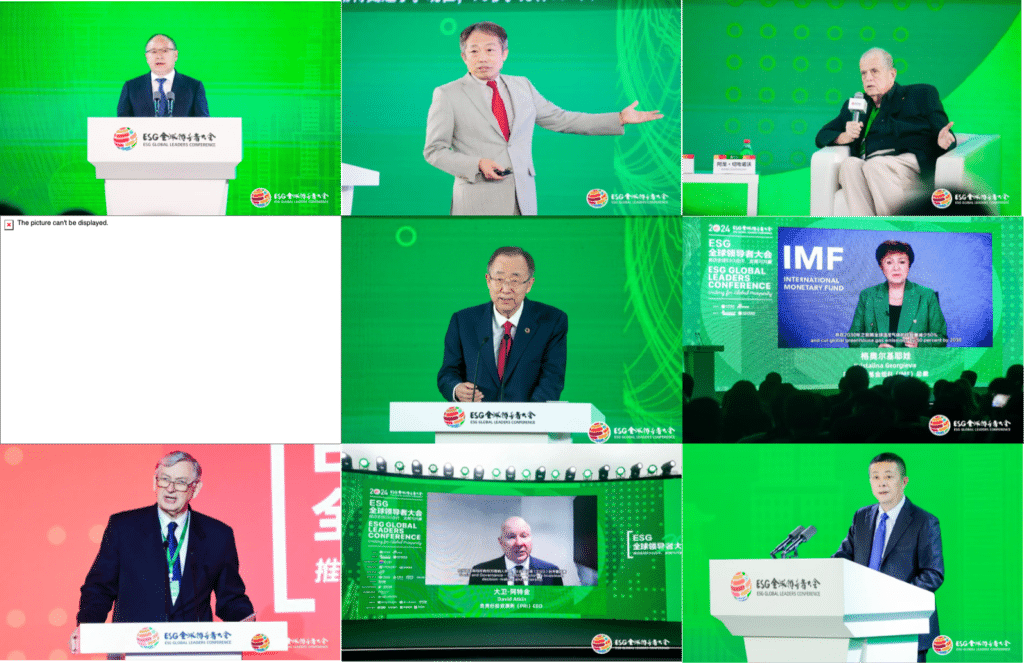From October 16 to 19, 2024, the Earth Charter International China Office was invited to participate in the 2024 Global Leaders Conference on Environmental, Social, and Governance (ESG). The theme of this conference was “Promoting Global ESG Cooperation, Development, and Win-Win Outcomes,” aiming to advance ESG objectives and advocate for the United Nations’ 2030 Sustainable Development Goals (SDGs).

As the largest national-level ESG event in China with significant international influence, this conference featured nine parallel forums focusing on cutting-edge topics such as energy and dual carbon goals, green finance, sustainable consumption, and technology for public good. Over 50 core topics will be explored, with more than 270 speakers in attendance, over half of whom were international guests, marking the highest number and caliber of participants in the conference’s history.
During the opening ceremony on the morning of October 16, Shanghai Municipal Party Secretary Chen Jining delivered a keynote address. He emphasized Shanghai’s commitment to accelerating the establishment of a green and low-carbon development mechanism, improving regulatory frameworks, promoting industry self-discipline, and enhancing corporate governance to create a favorable environment for the development of environmental, social, and corporate governance. Other notable attendees included Gu Shengzu, Vice Chairman of the 13th National Committee of the Chinese People’s Political Consultative Conference, and Gao Zhidan, Director of the National Sports Administration. Xi Guohua, Chairman of Citic Group, Cao Guowei, Chairman and CEO of Sina Group, and Tu Guangshao, Co-Chair of the ESG Leaders Forum, also attended and spoke on behalf of the organizers. Other notable attendees included Kristalina Georgieva, Managing Director of the International Monetary Fund (IMF); Danilo Türk, former President of Slovenia, former UN Deputy Secretary-General, and Chair of the World Leaders Alliance; Kim Won-soo, former UN Under-Secretary-General and Executive Director of the Ban Ki-moon Center; David Atkin, CEO of the UN Principles for Responsible Investment; George Kell, Chair of Arabesque Group and former Executive Director of the UN Global Compact; Aaron Ciechanover, 2004 Nobel Prize winner in Chemistry; and Michael Levitt, 2013 Nobel Prize winner in Chemistry, a member of the National Academy of Sciences, a Fellow of the Royal Society, and a professor of Structural Biology at Stanford University, among over 270 distinguished guests from China and around the world.
During the closing ceremony on the morning of October 19, former UN Secretary-General and Boao Forum for Asia Chairman Ban Ki-moon delivered a speech. He expressed deep gratitude for China’s commitment to achieving carbon neutrality by 2060, noting that this multifaceted commitment demonstrates the feasibility of reaching such ambitious climate goals for a cleaner environment.


On October 19, during the round-table forum titled “Protecting the Blue Planet,” Fang Hong, Executive Director, Earth Charter International China Center, was invited to participate in the dialogue and delivered a keynote speech. She emphasized that the Earth Charter encompasses sixteen principles, divided into four sections.
The first two sections focus on environmental aspects, including the respect and care for the community of life and ecological integrity, calling for humanity to honor the Earth and all its life forms with understanding, compassion, and love. The third section addresses social issues, highlighting social and economic justice, ensuring that all levels of economic activities and institutions prioritize sustainable development, and guaranteeing equal access to education, healthcare, and economic opportunities for everyone. The fourth section deals with policy governance, promoting democracy, non-violence, and peace, and fostering a culture of tolerance and non-violence.
Fang noted that even 30 years ago, before the term ESG was introduced, the pioneers of the Earth Charter drafting committee were already using an ESG framework to approach issues, creating this epic declaration of sustainable development to guide and evaluate the actions of individuals, organizations, enterprises, governments, and multinational institutions. Through her address, participants gained insight into the vision and goals of the Earth Charter.
Fang called on all levels of government, international organizations, enterprises, and associations to adopt the Earth Charter as an essential ethical framework for promoting ESG development. She urged them to incorporate the Charter as a key policy basis and guideline in the formulation of ESG strategies, management plans, and ESG disclosure standards.









